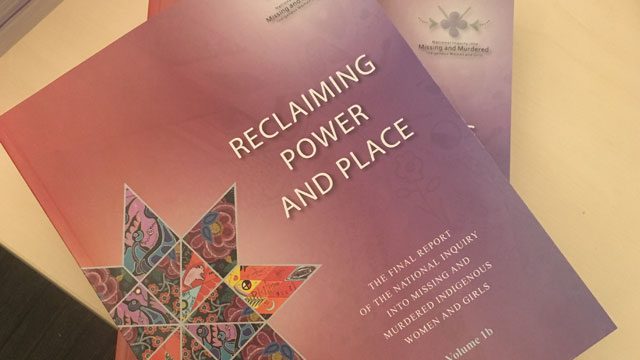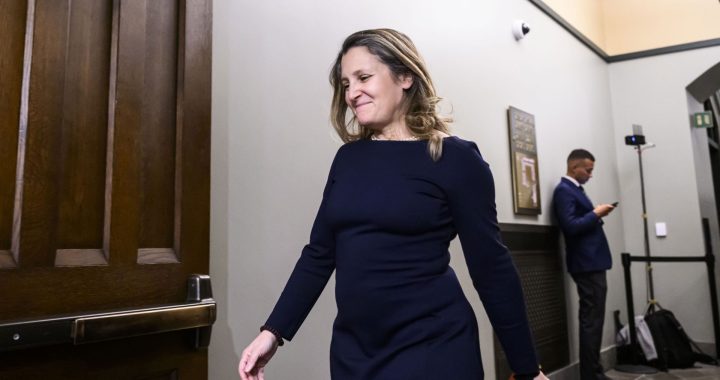
They’re talking about a revolution.
The National Inquiry into Missing and Murdered Indigenous Women and Girls is trying to make genocide a noun the way the Truth and Reconciliation Commission of Canada turned reconciliation into a verb.
“It is time to call it as it is,” the inquiry’s final report released Monday said.
“Canada’s past and current colonial policies, actions and inactions towards Indigenous Peoples is genocide.”
Read the national inquiry’s calls for justice
The allegation is a strong one.
It threatens to tarnish Canada’s stellar reputation for quality of life, its standard for peace, and its position of respect within the global community.
But Chief Commissioner Marion Buller said she and her three fellow commissioners “pulled out a mirror to Canada” over 33 months of gathering evidence and “reflected the truth back.”
When asked why they used the term genocide, she said “because that’s the inescapable conclusion.”
The term, she said, “explains the high rates of violence” against Indigenous women and girls – fulfilling the inquiry’s mandate to expose the root cause of gender-based discrimination and violence.
The tough talk shouldn’t come as a surprise.
The commissioners warned in November 2017 in their interim report – ‘Our Women and Girls are Sacred’ – they’d be “exposing hard truths about the devastating impacts of colonization, racism and sexism—aspects of Canada that many Canadians are reluctant to accept.”
The final report with 231 recommendations was swaddled in sealskin and wrapped with a traditional Métis sash before being handed to Prime Minister Justin Trudeau.
He took his seat cradling the bundle like a baby before his turn to address the crowd at the Canadian Museum of History in Gatineau, Que.
Trudeau promised to develop a national action plan to end violence against Indigenous women and girls and 2SLGBTQQIA people.
But didn’t say colonial violence was genocide.
“Canada has failed you,” he said. “This is an uncomfortable day for Canada but it is an essential day.”
By coincidence, Canada’s Museum for Human Rights in Winnipeg recently adopted the term genocide to describe the effects of colonization.
Read the executive summary here: Reclaiming Power and Place
Indigenous women and girls are 12 times more likely to be victims of crime – a staggering statistic by any metric.
But what’s worse, said the report entitled Reclaiming Power and Place, is that victims are made to feel at fault while governments and public services look the other way.
“This desire to maintain the status quo directly contributes to the targeting of Indigenous women, girls, and 2SLGBTQQIA people,” said Buller to a standing ovation.
“We need you to change,” added Commissioner Michèle Audette during her remarks.
“This is a historic day.”
Despite cries from the crowd demanding he say it, Prime Minister Justin Trudeau did not utter the word "genocide" in his speech after being handed a copy of the #MMIWG National Inquiry final report. @APTNNews #cdnpoli pic.twitter.com/ZWawUEvYyF
— Justin Brake (@berrygrounds) June 3, 2019
Representatives from all provinces and territories were present to accept copies of the report. As were some chiefs of police including Danny Smyth of Winnipeg.
But not the head of the RCMP, a police service heavily criticized in the report for the way it handles missing and murdered cases.
Commissioner Brenda Lucki “was unable to attend today’s event,” a spokeswoman said, releasing a written statement instead thanking the inquiry for its important work.
“We are committed to achieving reconciliation with Indigenous peoples through a renewed relationship built on the recognition of rights, respect, co-operation and partnership,” the statement said.
“We have already made many changes to our policies, procedures and training over the course of the inquiry.”
When APTN News asked what Lucki was doing, the RCMP did not reply.
While the 1,200-page report records the trauma and stress of grieving families, it also reflects the resilience of Indigenous communities.
And, it concludes women are tired of being victims. Preferring to move forward through action towards justice.
With a focus on the perpetrators – whether they be human or systemic.










